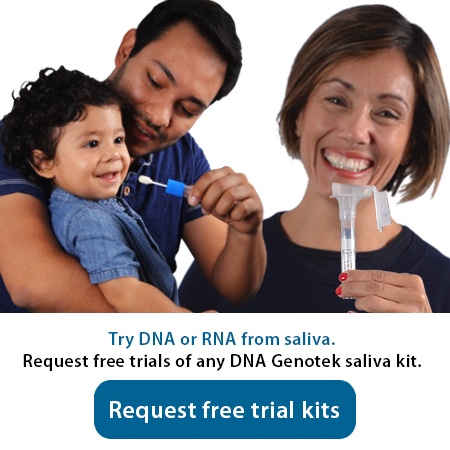2021-04-06
Epigenetic information such as DNA methylation is a useful biomarker that reflects complex gene‐environmental interactions that can be linked to understanding disease, especially neuropsychiatric disorders. When studying epidemiology in cohorts, peripheral tissues such as blood and saliva are the common sample types used.
“Because cohort studies usually deal with hundreds to thousands of subjects in a longitudinal manner, saliva has clear advantages over blood because it is noninvasive, easy to use, and does not require trained medical professionals for sample collection. However, saliva has been used less often than blood in epigenetic studies, and only a few studies have addressed the epigenetic characteristics and uniqueness of saliva.” - Murata et al.
Epidemiology studies tend to mainly use blood, while only a few studies have used saliva. A research group in Kumamoto University, Japan, (Murata et al.) sought to test the usability of saliva vs blood for examining DNA methylation.
Blood vs saliva for DNA methylation: proven use cases
Not many epidemiologists are aware that saliva can be a suitable alternative for blood. As stated in our blog Genome-wide DNA methylation comparison: Brain tissue vs. Blood, saliva and buccal cells, some researchers worry that saliva’s mix of leukocytes and buccal cells might not be suitable for DNA methylation. However, Braun et al.’s study (article linked above) compared blood, saliva, and buccal cells to live brain tissue and found that saliva’s mix of leukocytes and buccal cells actually made saliva more suitable than blood for DNA methylation for it contains a higher correlation to live brain tissue. Another group, Humphreys et al. (featured in: DNA methylation with saliva: A strong predictor of major depressive disorder) also found saliva very suitable for DNA methylation studies for neuropsychiatric disorders.
However, as stated in the quote from Murata et al.1 above, only a few of these studies have addressed the epigenetic characteristics of saliva.
Epigenetic characteristics of saliva for DNA methylation
In order for Murata et al., to investigate the usefulness of saliva versus blood, they had to:
- Identify differentially methylated CpG sites (regions of DNA where cytosine and guanine nucleotides occur within high frequency) between blood and saliva and revealed their characteristics.
- Test whether the CpG sites showing large interindividual methylation differences in blood also showed variations in saliva.
From 22 volunteers they collected paired blood and saliva samples using Oragene•DNA. During the sample collection process, they found saliva proved to be easy, non-invasive, and can be self-administered by the donor compared to blood that is invasive and requires a trained phlebotomist.
The salivary DNA was extracted using DNA Genotek’s prepIT sample purification reagent and analyzed with Illumina’s Infinium Human Methylation450 BeadChip. [Click to learn more about prepIT]
DNA methylation profiles of the paired blood and saliva samples were compared.
“As expected, the DNA methylation profiles showed a high correlation (R=0.977) between the two sample sources [blood and saliva], indicating a close relationship between them.” Murata et al.
To determine the usefulness for saliva of the CpG sites previously identified in blood from a study conducted by Hachiya et al (2017)2, Murata et al. compared the variance of DNA methylation levels in their data with that of Hachiya’s.
“As expected, we observed a positive correlation between our blood data and that of the previous study (R = 0.362, P < 2.2 × 10–16). We also found a significant correlation between our saliva data and the previous blood data (R = 0.323, P < 2.2 × 10–16), suggesting that saliva does reflect the interindividual DNA methylation profiles identified in blood.” Murata et al.
As Murata et al. and others have proven, saliva is not only comparable to blood in genetic analysis but in epigenetics as well, making it a preferred non-invasive sample method for donors and a proven sample type for scientists.
Related content: Can saliva replace blood for DNA collection & analysis?
If you are interested to learn more about Oragene•DNA saliva collection kit, you can send us an email at info@dnagenotek.com or click the photo below to request free kits to try in your lab.
References:
[1] https://www.ncbi.nlm.nih.gov/pmc/articles/PMC7292296/
[2] Hachiya T et al. Genome‐wide identification of inter‐individually variable DNA methylation sites improves the efficacy of epigenetic association studies. NPJ Genom Med. 2017;2:11


